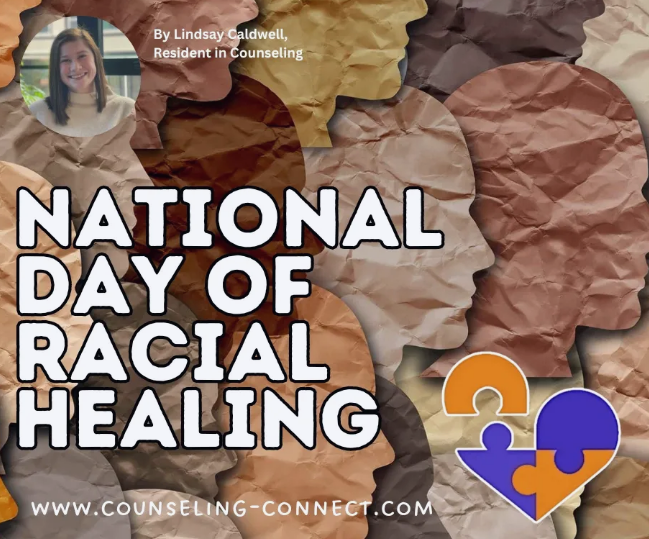By Lindsay Caldwell, Resident in Counseling
January 16th marked the National Day of Racial Healing. This day holds significance because it prompts reflection on the pervasive impact of systemic racism within our society. Acknowledging the existence of racial trauma and its repercussions on individuals and communities is crucial for fostering a collective understanding of the deep-seated issues at hand. This designated day creates an opportunity for open dialogue and meaningful conversations about the ways in which systemic racism affects the well-being of diverse populations.
This day serves as a call to action for societal transformation. It encourages individuals, organizations, and communities to engage in initiatives that dismantle racial barriers and promote inclusivity. By collectively recognizing and addressing the wounds caused by racial injustice, we can contribute to the creation of a more equitable and supportive environment for everyone. This day is a reminder that healing is a collaborative effort, requiring a commitment to dismantling systemic inequalities and fostering unity across diverse backgrounds.
A great way to continue reflection and action, is to change the narrative; racial healing is not about blame, it’s about working together to end discrimination and oppression for everyone. Certain outlooks, such as denials of systemic racism or having a colorblind mindset are ineffective and do not foster equity. When we don’t see racial differences, it “allows for racism and other ‘isms’ to operate undetected (O’Reilly, 2021). We can shift our perspective away from a shallow understanding of diversity and develop a Liberation mindset, which is a holistic, anti-oppression, and strength based mentality. Instead of asking “What’s wrong with you?” the Liberation mindset asks “What happened to you and your ancestors? What continues to happen to you? How can we heal the wounds of the past to help you thrive in the present?” (O’Reilly, 2021).
Counselors are agents of positive social change. We are tasked by our Code of Ethics to advocate for social justice. There are several social justice issues that we need to address and racism is one of them. When it comes to racial healing, we encourage people to educate themselves on the history of systemic racism and its implications on modern-day life. Engaging in open and honest conversations about race with those in our social circles can be a powerful step toward creating a more inclusive and understanding community. We can also foster racial healing by supporting organizations and donating funds or volunteer time to initiatives that work towards racial equity and justice.
Reference:
O’Reilly, M. (2021). Social Based Practices in Evidence Based Clinical Care. https://learning.simplepractice.com/courses/social-justice-practices-in-evidence-based-care?sessionFields=%5B%5B%22topic%22%2C%22Cultural%20competency%20and%20diversity%22%5D%5D
Human Rights Careers. No date. 15 Social Justice Issues We Must Address. https://www.humanrightscareers.com/issues/social-justice-issues/

